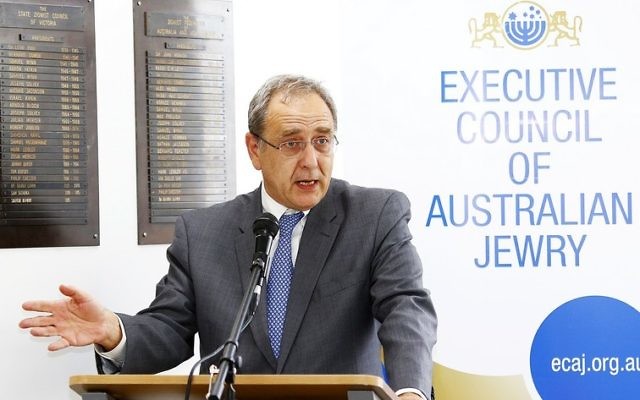Looking back on a topsy-turvy year
IN so many ways, 5778, Israel's 70th anniversary year, has been a cocktail of both negative and positive. It has been a topsy-turvy year for us in the international arena, a year of turmoil in the Middle East and a year of mixed relations with our closest neighbours. And yet when we examine the issues closely, we can look to the future with a cautious, yet palpable sense of hope and optimism that the positive will outweigh the negative and the future seems bright.
IN so many ways, 5778, Israel’s 70th anniversary year, has been a cocktail of both negative and positive. It has been a topsy-turvy year for us in the international arena, a year of turmoil in the Middle East and a year of mixed relations with our closest neighbours. And yet when we examine the issues closely, we can look to the future with a cautious, yet palpable sense of hope and optimism that the positive will outweigh the negative and the future seems bright.
In the international sphere, hypocrisy towards Israel continues to abound. Anti-Israel activists continue to demonise us on every issue, despite the fact that the vast majority of the countries they support flout every one of the norms they purportedly hold dear. But when it comes to Israel and the region, those norms simply dissipate into thin air. Antisemitism continues to rear its ugly head in the UK and elsewhere, most frighteningly among those who pretend to consider anti-racism at the top of their agenda. And yet, the international arena has also seen a serious and effective effort for the first time, spearheaded by the US ambassador to the UN Nikki Haley, to change the knee-jerk, anti-Israel response in international fora.
We also witnessed the recognition of Jerusalem by the world’s leading superpower and the establishment there of its embassy, as well as a surge in Israel’s foreign relations, most notably in Asia and Africa.
The Middle East continues with its bloody and heavily under-reported conflicts in Syria, Yemen and elsewhere. Here, too, hypocrisy abounds. Any search for a BDS movement against the Syrian or Iranian regimes which continue to trample human rights and human lives will lead to a blank page. Yet on the other hand, Iranian irredentism and Islamist extremism in the region have given rise to a growing realisation that Israel is part of the solution to these evils, not part of the cause. As such, we are witnessing fundamental change in the strategic architecture of the region, with the more forward-looking countries increasingly collaborating with us against regional threats. With many of these countries, relations have never been better.
Sadly, the Palestinians continue to be victims of their own leadership. Hamas in Gaza continued squandering its resources on attacking Israel with mortar and rocket-fire and with a “scorched earth” policy of thousands of incendiary devices which, despite causing intense hardship for communities in southern Israel, have not benefited Gazans one iota. So much so, that even Hamas, with its rabid destructionist approach, is now forced to re-examine itself, finding that calm begets calm, and that hostility depletes its military infrastructure to the point of obliteration. Leaders and commentators expected much more from Mahmoud Abbas, yet he has failed to deliver the necessary leadership. His recent horrendous speech in which he effectively blamed the Jews for the Holocaust, and after which he issued an insincere semi-apology, has fed into serious doubts around the world as to his leadership capabilities. It is to be hoped that any new Palestinian leadership will be an improvement on its predecessors.
If there is one area in which the year has been an almost unrivalled success, it has been in our bilateral relations with Australia. This has found expression in international fora and in rapidly expanding ties between us in the national security, commercial, academic and political arenas. The highly successful visits to Israel of the then PM Malcolm Turnbull and Opposition Leader Bill Shorten for the Beersheba Centenary and more are the clearest manifestations of this. This relationship, which is and will continue to be bipartisan, did not materialise in a vacuum.
There remains a deep understanding within the Australian political leadership that Israel is an island of stability and values in a sea largely surging with instability and rights abuses.
However, no less important in this endeavour has been the unswerving activism of the Jewish community and its leadership. In the months since my arrival here, I have made every effort to place engagement with the community as a highest priority, together with my outstanding team. The entire diplomatic staff of the embassy is currently being replaced, including our exceptional deputy chief of mission Anat Sultan-Dadon, yet together with the new team I will continue to foster this relationship and engage with our community at all levels.
So 5778 has seen both opportunities and challenges for Israel, externally and internally. Among the latter is the relationship with world Jewry, particularly in the advent of the heated debate over recent legislation. There must never be daylight between us and I am encouraged by the approach of the new Jewish Agency head, Isaac Herzog, recently in Australia, that he will stop at nothing to achieve this.
We face a daunting agenda, but we know we can count on your continued support. In the words of the Talmudic phrase, “Let us usher out the curses of the past year, and ring in the blessings of the new one.”
I wish all in this unique community– Shana Tova U’metuka.
Mark Sofer is Israel’s Ambassador to Australia.


comments